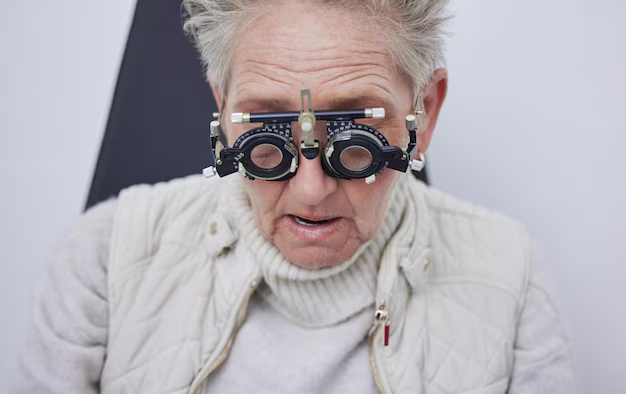Your Guide to Can Cataracts Cause Blindness
What You Get:
Free Guide
Free, helpful information about Cataract FAQ and related Can Cataracts Cause Blindness topics.
Helpful Information
Get clear and easy-to-understand details about Can Cataracts Cause Blindness topics and resources.
Personalized Offers
Answer a few optional questions to receive offers or information related to Cataract FAQ. The survey is optional and not required to access your free guide.
Understanding Cataracts: Can They Lead to Blindness?
The prospect of losing one's sight is daunting for anyone, and understanding the connection between cataracts and blindness is a critical concern for those affected by this eye condition. While cataracts are commonplace, their implications on vision can vary significantly, leading many to wonder: Can cataracts cause blindness?
🌟 What are Cataracts?
Cataracts are a clouding of the eye's natural lens, which lies behind the iris and pupil. This condition is most commonly associated with aging, but several other factors can also contribute to its development, including:
- Genetic predisposition: Family history might increase risk.
- Diabetes: This metabolic disorder can accelerate cataract formation.
- Previous eye injury or surgery: Can expedite cataract development.
- Prolonged use of steroid medications: In particular, at high doses.
- Exposure to ultraviolet (UV) light: Sun damage over time can contribute.
The lens becomes less transparent, progressively obstructing light as it passes through to the retina, leading to blurred vision or a noticeable decrease in visual acuity.
Can Cataracts Lead to Blindness?
In essence, untreated cataracts have the potential to develop into severe vision impairment, even blindness. However, understanding the trajectory is essential:
🧐 Gradual Progression
Cataracts typically progress slowly. What begins as minor vision changes can escalate into significant vision loss, impacting daily activities such as:
- Reading: Difficulty in reading without bright light or magnification.
- Driving: Trouble with night vision and increased glare from headlights.
- Recognizing faces: Distorted vision makes it challenging to recognize people.
🎯 Severity and Impact
The extent to which vision is impaired depends on the density and location of the cataract. For many individuals, cataracts remain mild and manageable, but as they advance, they can obstruct almost all sight.
- Nuclear cataracts: Start in the center of the lens.
- Cortical cataracts: Begin in the lens cortex and spread inward.
- Subcapsular cataracts: Occur at the back of the lens.
Where cataracts are dense, the lack of light reaching the retina can result in functional blindness, where daily life activities become severely restricted due to hampered vision.
🚦 Intervention is Key
It's important to note that cataracts are highly treatable. Cataract surgery is one of the most common and effective treatments with high success rates. The surgery involves removing the cloudy lens and replacing it with an artificial intraocular lens (IOL).
When to Seek Treatment?
Signs it might be time to consult an eye care professional include:
- Significant blurriness: Impacts reading and distant vision.
- Increased glare: Light sensitivity obstructing daily activities.
- Poor night vision: Difficulty adapting to low light environments.
Addressing Cataract Concerns
Even as cataracts aren't always immediately threatening, here are several considerations to keep your vision in check:
🤔 Debunking Myths
Cataracts are not reversible with medication or eye drops. They require surgical intervention to clear the obstructed lens.
Not caused by excessive eye strain. Cataracts are primarily age-related or due to the aforementioned risk factors.
💡 Prevention and Management
While cataracts can't be entirely prevented, there are lifestyle adjustments that may help delay their onset:
- Wear sunglasses: Protecting eyes from UV light can slow cataract development.
- Manage health conditions: Keeping diabetes and hypertension under control is vital.
- Avoid smoking: Smoking cessation can have considerable benefits for eye health.
📝 Regular Eye Check-Ups
Routine eye exams can help identify cataracts early:
- Every 2 years for adults aged 40 to 64.
- Annually for those over 65 or with risk factors.
Early detection allows for timely intervention and better management of symptoms, maintaining quality of life and reducing anxiety about significant vision loss.
📋 Key Takeaways on Cataracts
Here's a quick bullet-point summary for maintaining your eye health in relation to cataracts:
- 👓 Regular Eye Exams: Critical for catching changes early and planning interventions.
- 🌞 UV Protection: Wear sunglasses with UV protection to slow progression.
- 🚭 Lifestyle Modifications: Quit smoking and manage health conditions to reduce risks.
- 🕒 Proactive Treatment: Seek professional advice if vision impairment affects daily life.
Embracing Better Vision
While cataracts and their potential implications on vision can be intimidating, being informed is empowering. With cataracts being both common and treatable, recognizing their signs, pursuing consistent screenings, and embracing recommended lifestyle practices can significantly reduce the risk of severe vision impairment or blindness. Always consult with an eye care professional for personalized advice and to discuss the best options for maintaining optimal eye health.
What You Get:
Free Cataract FAQ Guide
Free, helpful information about Can Cataracts Cause Blindness and related resources.

Helpful Information
Get clear, easy-to-understand details about Can Cataracts Cause Blindness topics.

Optional Personalized Offers
Answer a few optional questions to see offers or information related to Cataract FAQ. Participation is not required to get your free guide.


